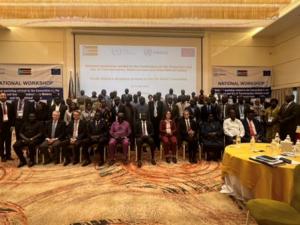
South Sudan, the world’s newest nation and a landlocked country in Eastern Central Africa, is situated in the middle of the basin of the Nile River, Africa’s longest river. Sharing significant transboundary wetlands, experiencing annual catastrophic floods and droughts and facing immense development and humanitarian challenges, South Sudan views strengthened transboundary cooperation as a pillar of its long-term recovery, sustainable growth and regional integration.
In this context, South Sudan confirmed during a national workshop its intention to accelerate the process of accession to the Convention on the Protection and Use of Transboundary Watercourses and International Lakes (UN Water Convention). The Convention constitutes a unique global legal and intergovernmental framework for the sustainable management of transboundary water resources, serviced by UNECE. South Sudan’s Minister of Water Resources and Irrigation, Hon. Pal Mai Deng, highlighted that the country “is in the heart of Nile basin whose waters are transboundary in nature” and that “being part of this global convention will open for us huge opportunities beyond measure”.
The national workshop, organized on 18-19 July 2024 in Juba, was an opportunity to detail the obligations under the Convention, the benefits of accession, possible challenges, as well as the next steps in the process. Bringing together over 80 participants from different ministries, basin and regional organizations, academia and civil society, among others, the national workshop unpacked how the UN global Water Conventions (the 1992 UN Water Convention, and the 1997 Convention on the Law of the Non-Navigational Uses of International Watercourses (UN Watercourses Convention) will add value to the many existing transboundary water cooperation initiatives which South Sudan is already a part of or in the process of joining. The Minister specifically called upon “development partners and donors agencies to support us in building capacity in the implementation of this Convention to […] add value to our existing knowledge of transboundary water management and governance.”
This workshop was timely as South Sudan is currently in the process of becoming a member of several basin agreements. A week prior on 8 July, South Sudan’s Transitional National Legislative Assembly unanimously ratified the Nile Basin Initiative (NBI)1 Cooperative Framework Agreement (CFA), established in 1999. In May, the Ministry officially informed the Lake Victoria Basin Commission (LVBC) it intends to join the other riparian countries – Tanzania, Uganda, Kenya, Burundi, and Rwanda – as members of the Commission, which was established in 2003. By joining both transboundary basin agreements and their associated institutions, South Sudan indicated it is seeking to unlock major infrastructure projects and development resources as well as to limit flooding. Representatives from the NBI and the LVBC were supported by the UN Water Convention to participate in the workshop to share the rich cooperation experiences from their respective basin organisations, outline their compatibilities with the Convention and identify synergies for mutually reinforcing implementation.
The notable momentum towards accession to the UN Water Convention in Africa, with Cote d’Ivoire becoming the 10th Party in Africa and 53rd overall and then Zimbabwe became the 54th Party and 11th in Africa this month, joining Parties Chad, Senegal, Ghana, Guinea Bissau, Togo, Cameroon, Nigeria, Namibia and The Gambia. Since the global opening of the Convention to all UN Member States in 2016, 13 countries – including Iraq and Panama who became the first Parties in their respective regions in 2023 – have joined the Convention. Over 20 more are in the process of joining, the majority of which are in Africa, including Zambia and Sierra Leone, which are in the final stages of accession. In the East African Community, South Sudan’s co-riparians Uganda (sharing the Nile River and Lake Victoria) and Tanzania (sharing the Nile River) are currently in accession processes.
The recent results of the 3rd reporting exercise measuring progress to achieve SDG indicator 6.5.2 on transboundary water cooperation submitted to the co-custodian agencies UNECE and UNESCO demonstrate South Sudan’s efforts already towards strengthening transboundary cooperation. 55.5% of the country’s shared basins are covered by operational cooperation agreements. Despite strong progress, challenges were also highlighted, especially with regards to resource constraints, legal and institutional fragmentation for managing water, data collection and management and groundwater management.
Recognized by the acting Ambassador of the Delegation of the European Union to South Sudan, Mr. Lothar Jaschke, as a “historical moment” for South Sudan, Convention accession will complement its ongoing initiatives on transboundary water cooperation, highlighting also the importance given by the EU to transboundary water cooperation as a tool for peace, security and stability, the workshop paved the way for promising work to strengthen transboundary water cooperation and management at national and regional level. As such, implementing the UN Water Convention will build on the existing initiatives and work already undertaken by South Sudan and in collaboration with relevant technical and financial partners.
The workshop was organized under the European Union project "Promoting accession to the Water Convention", which aims to support accession to and implementation of the Water Convention, thereby strengthening transboundary water cooperation and the sustainable and peaceful management of shared water resources.

